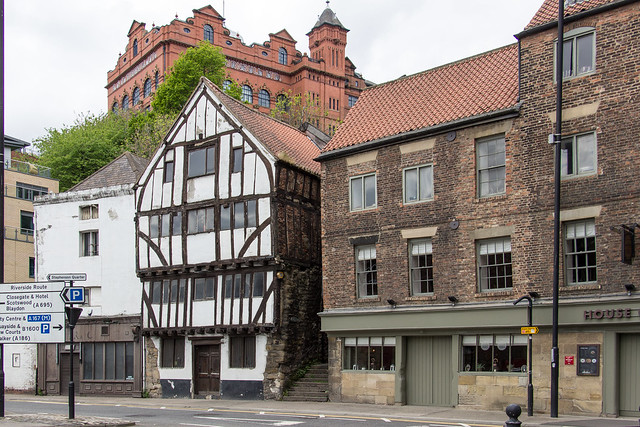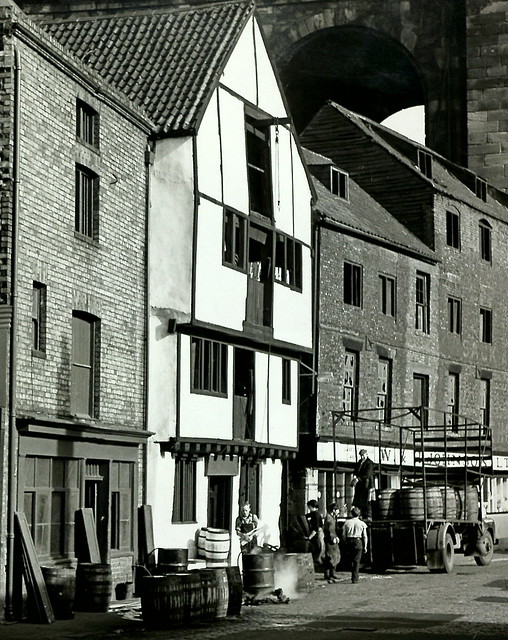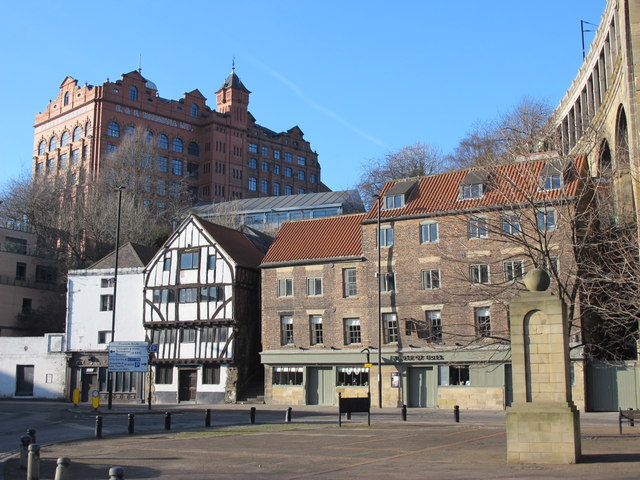Nos. 28, 30, and 32 Close, Newcastle-upon-Tyne, England

-
Description
To the right are Nos. 28 and 30, they are grade I listed historic buildings constructed in the late 1500's as a large house for a merchant. The front was redone in brick c. 1800. The half-timbered building is No 32 and is a grade II* listed historic public house constructed in the 1400's with later alterations. The building behind up on the hill is Turnbull's Warehouse, a grade II listed historic warehouse constructed in 1888 with a southern extension in 1897 and the tower added in 1898. "Newcastle upon Tyne (/ˌnjuːkɑːsəl -/, locally /njuːˌkæsəl -/), commonly known as Newcastle, is a city in Tyne and Wear, North East England, 103 miles (166 km) south of Edinburgh and 277 miles (446 km) north of London on the northern bank of the River Tyne, 8.5 mi (13.7 km) from the North Sea. Newcastle is the most populous city in the North East, and forms the core of the Tyneside conurbation, the eighth most populous urban area in the United Kingdom. Newcastle is a member of the UK Core Cities Group and is a member of the Eurocities network of European cities. Newcastle was part of the county of Northumberland until 1400, when it became a county of itself, a status it retained until becoming part of Tyne and Wear in 1974. The regional nickname and dialect for people from Newcastle and the surrounding area is Geordie. Newcastle also houses Newcastle University, a member of the Russell Group, as well as Northumbria University. Newcastle is member of the North of Tyne Combined Authority. The city developed around the Roman settlement Pons Aelius and was named after the castle built in 1080 by Robert Curthose, William the Conqueror's eldest son. The city grew as an important centre for the wool trade in the 14th century, and later became a major coal mining area. The port developed in the 16th century and, along with the shipyards lower down the River Tyne, was amongst the world's largest shipbuilding and ship-repairing centres. Newcastle's economy includes corporate headquarters, learning, digital technology, retail, tourism and cultural centres, from which the city contributes £13 billion towards the United Kingdom's GVA. Among its icons are Newcastle United football club and the Tyne Bridge. Since 1981 the city has hosted the Great North Run, a half marathon which attracts over 57,000 runners each year." - info from Wikipedia. Summer 2019 I did a solo cycling tour across Europe through 12 countries over the course of 3 months. I began my adventure in Edinburgh, Scotland and finished in Florence, Italy cycling 8,816 km. During my trip I took 47,000 photos. Now on https://www.instagram.com/billyd.wilson/" rel="noreferrer nofollow">Instagram. Become a patron to my photography on https://www.patreon.com/billywilson" rel="noreferrer nofollow">Patreon. -
Owner
Billy Wilson Photography -
Source
Flickr (Flickr) -
License
What does this mean? Attribution-NonCommercial License
-
Further information
Link: https://www.flickr.com/photos/32132568@N06/49974548003/
Resource type: Image
Added by: Simon Cotterill
Last modified: 5 years, 6 months ago
Viewed: 673 times
Picture Taken: 2019-05-19T07:48:52 -
Co-Curate tags





